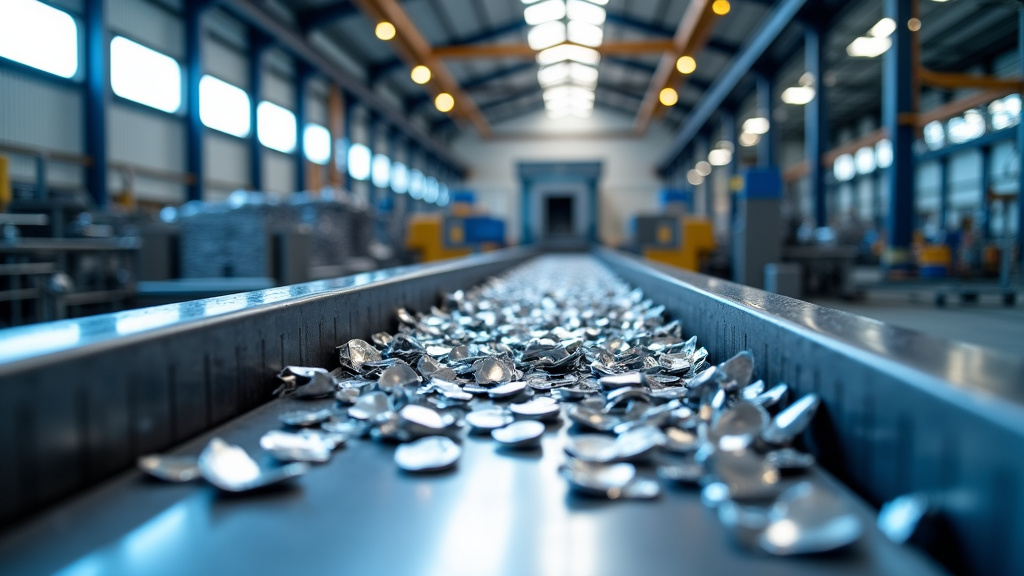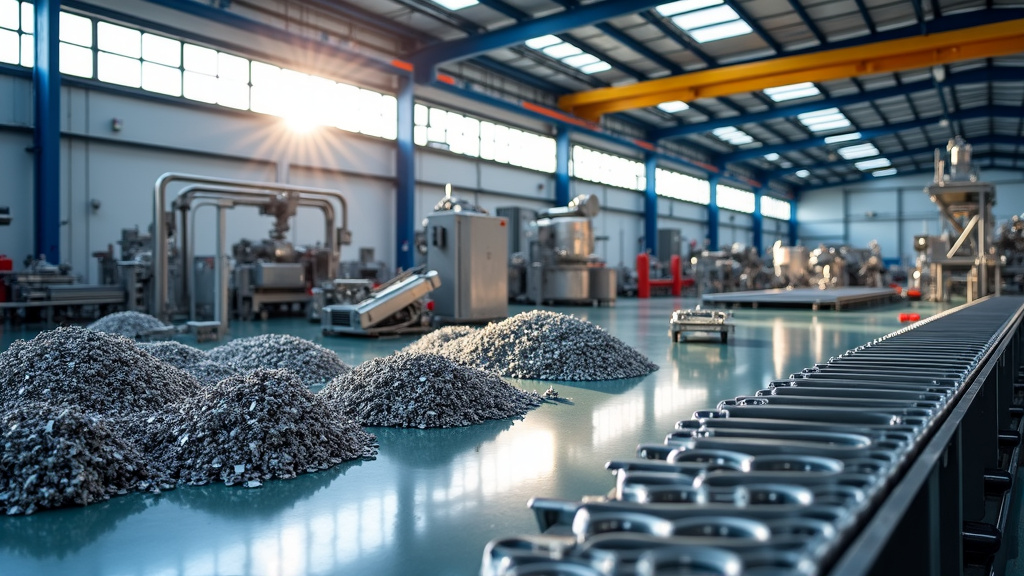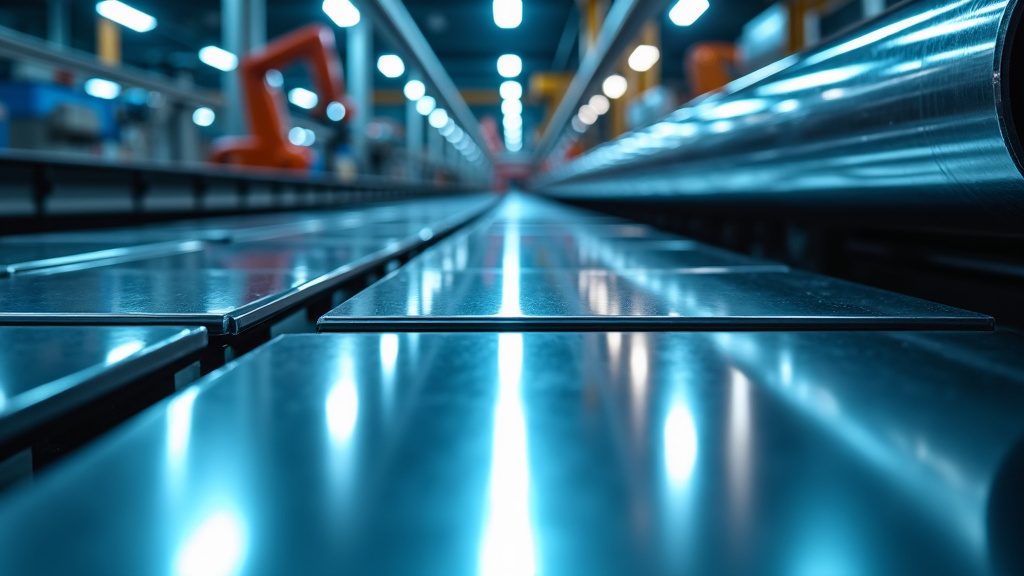5901 Botham Jean Blvd, Dallas, TX 75215
Stainless Steel Recycling Prices: Everything You Need to Know
March 25, 2025Have you ever considered the hidden value in that old stainless steel appliance gathering dust in your garage? The world of stainless steel recycling prices is more dynamic and impactful than you might think. From global economic shifts to local supply and demand, numerous factors influence the stainless steel recycling price you might receive or pay on any given day.
Stainless steel, with its durability and corrosion resistance, is an integral part of our modern world. But what happens when these products reach the end of their lifecycle? This is where recycling comes into play, offering both environmental and economic benefits. As of 2024, stainless steel scrap prices can range from approximately $0.50 to $2.50 per kilogram, reflecting the complex interplay of market forces at work.
In this guide, we’ll explore the key elements that drive these fluctuations in stainless steel recycling prices.
The Economic Benefits of Recycling Stainless Steel

Recycling stainless steel isn’t just environmentally friendly; it also offers significant economic advantages. From reducing production costs to creating jobs, the financial benefits of this practice are transforming industries and local economies alike.
Let’s explore the financial impact of giving stainless steel a second life. You might be surprised at how this seemingly simple act can affect both business profitability and community prosperity.
Cutting Costs, Boosting Profits
For manufacturers, recycled stainless steel is akin to finding money on the factory floor. Utilizing reclaimed materials can cut production costs by up to 25% compared to using new stainless steel. This significantly boosts profit margins in an industry where every penny counts.
This cost efficiency affects the entire supply chain. Lower material costs allow companies to offer more competitive prices without compromising quality. It’s a win-win that keeps stainless steel products affordable while maintaining healthy business profits.
Beyond direct savings, recycling reduces the need for expensive raw material extraction and processing. Mining operations and refineries are resource-intensive. By using existing steel supplies, companies avoid these expenses entirely.
Energizing Economies Through Efficiency
The energy savings from recycling stainless steel are substantial. According to research from the British Stainless Steel Association, recycling results in a 33% reduction in energy consumption for global austenitic stainless steel production. In an ideal scenario with 100% recycled content, that figure increases to an impressive 84% energy reduction.
These energy savings translate directly into economic benefits. Lower energy requirements mean reduced operational costs for recyclers and manufacturers. It also decreases dependence on volatile energy markets, providing more stability to the stainless steel industry as a whole.
Communities benefit too. Decreased energy demand can lead to lower utility costs and improved energy security. It’s an economic ripple effect that affects businesses and households alike.
Jobs, Jobs, and More Jobs
The recycling industry isn’t just processing steel; it’s creating careers. In the United States alone, recycling companies employ over 150,000 people and generate $50 billion in economic activity annually. Stainless steel plays a significant role in this job creation engine.
These aren’t just any jobs. The stainless steel recycling process creates positions across various skill levels. From collection and sorting to high-tech processing and manufacturing roles, there are opportunities for workers of all backgrounds.
Moreover, these tend to be local jobs that are not easily outsourced. Recycling facilities become anchors in their communities, providing stable employment and stimulating local economic growth.
Fueling a Circular Economy
Stainless steel’s infinite recyclability makes it a model for the circular economy. This approach aims to eliminate waste and maximize resource use—principles that align perfectly with stainless steel recycling.
As businesses and governments increasingly prioritize sustainability, industries focused on recyclable materials like stainless steel are poised for growth. This creates new market opportunities and drives innovation in recycling technologies and processes.
The economic benefits extend beyond the recycling industry itself. Manufacturers using recycled stainless steel can market their products as eco-friendly, tapping into growing consumer demand for sustainable goods. It’s a competitive advantage that can boost sales and brand loyalty.
Success in Action: A Community Transformed
The town of Millport, Alabama, provides a compelling case study in the economic power of stainless steel recycling. When a major stainless steel recycling facility opened there in 2018, it brought more than just jobs to this rural community of 1,000 people.
The facility created 50 direct jobs, but its impact extended far beyond. Local businesses saw increased activity from the influx of workers. Property values rose as people moved to the area for employment. The expanded tax base allowed for improvements to schools and infrastructure.
Perhaps most importantly, the recycling plant provided economic diversification in a region traditionally reliant on agriculture. It’s a prime example of how stainless steel recycling can rejuvenate local economies and create lasting prosperity.
As we’ve seen, recycling stainless steel isn’t just about being green—it’s a smart economic move with far-reaching benefits. From cost savings and energy efficiency to job creation and community revitalization, the financial case for stainless steel recycling is as strong as the material itself.
| Aspect | Recycled Stainless Steel | Virgin Stainless Steel |
|---|---|---|
| Energy Consumption | 26,000 MJ/ton | 79,000 MJ/ton |
| Energy Savings | 67% less than virgin production | 0% |
| CO2 Emissions | 1.6 tons CO2/ton | 5.3 tons CO2/ton |
| Cost | $415 per metric ton | $920 per metric ton |
How Okon Recycling Can Help with Stainless Steel Recycling Price

In the dynamic field of metal recycling, Okon Recycling exemplifies expertise and innovation. Established in 1909, this Dallas-based company has navigated over a century of industry changes, emerging as a leader in stainless steel recycling solutions. What distinguishes Okon in a market where price often dictates decisions?
Central to Okon’s appeal is its commitment to competitive pricing and environmental stewardship. The company’s state-of-the-art 20-acre facility is not just impressive in size but also a testament to their investment in cutting-edge technology. This technological edge translates into more efficient processing and, consequently, better prices for clients.
For businesses dealing with industrial-scale stainless steel waste, Okon’s expertise is invaluable. Their ability to handle large volumes efficiently means they can offer competitive rates even for substantial quantities. This scalability is crucial for industries where stainless steel scrap is a significant byproduct.
Okon’s approach extends beyond price considerations. They recognize that sustainability is as important as the bottom line. By ensuring that stainless steel is properly recycled and repurposed, Okon helps clients meet their environmental goals while maximizing the value of their scrap materials.
What truly sets Okon apart in stainless steel recycling is their tailored approach. Recognizing that one size doesn’t fit all, especially in industrial recycling, they offer customized solutions. Whether it’s on-site processing for large industrial clients or specialized container services for smaller businesses, Okon adapts its services to meet specific needs.
Competitive Pricing Through Innovation
Okon’s pricing strategy is closely tied to its innovative practices. By continually updating their facility with the latest technology, they’ve streamlined the recycling process, reducing both time and energy expenditure. This efficiency benefits the environment and allows Okon to offer more competitive prices to their clients.
The company’s investment in a diverse fleet of heavy-duty vehicles enhances their ability to offer attractive prices. By handling transportation in-house, Okon eliminates third-party costs, passing savings on to their clients. This vertical integration is a key factor in their pricing strategy.
Moreover, Okon’s expertise in sorting and processing various grades of stainless steel ensures that clients receive maximum value for their materials. Their ability to accurately assess and categorize different types of stainless steel scrap means that high-grade materials are properly identified and priced accordingly.
Okon’s pricing isn’t just about offering the highest dollar amount. Their approach to value includes considerations like timely pickups, flexible scheduling, and transparent reporting. These factors contribute to a holistic pricing model that often proves more beneficial to clients in the long run.
For businesses dealing with specialty stainless steel alloys, Okon’s expertise is particularly valuable. Their knowledge of niche markets for these materials often allows them to offer premium prices for what might otherwise be considered standard scrap by less specialized recyclers.
Tailored Solutions for Industrial Clients
Okon’s approach to industrial stainless steel recycling is comprehensive. They recognize that large-scale industrial clients have unique challenges and requirements. To address these, Okon offers a range of specialized services designed to maximize efficiency and value for industrial partners.
One standout offering is on-site processing. For industries generating large volumes of stainless steel scrap, this service is transformative. By bringing their mobile recycling equipment directly to the client’s facility, Okon eliminates transportation costs and reduces the logistical complexities of managing large-scale scrap.
This on-site capability isn’t just about convenience; it’s a strategic advantage in pricing. By processing materials at the source, Okon can offer more competitive rates, as the reduced transportation and handling costs are factored into the pricing structure. It’s a win-win where efficiency translates into better value for the client.
For clients with diverse recycling needs, Okon’s ability to handle multiple types of materials is invaluable. Their expertise extends beyond stainless steel to include a wide range of metals and even specialized materials like rare earth magnets. This comprehensive approach allows industrial clients to streamline their recycling processes, potentially leading to better overall pricing across all their recyclable materials.
Okon’s industrial solutions also include custom container services. They offer a variety of container sizes and types, from 20-yard to 60-yard containers, as well as specialized options like flatbeds and lowboys. This flexibility ensures that industrial clients can choose the most cost-effective collection method for their specific production environment and volume of scrap.
Sustainability: More Than Just a Buzzword
In stainless steel recycling, Okon Recycling’s commitment to sustainability isn’t just an ethical stance; it’s a core part of their business model that directly influences their pricing structure. This dedication to environmental responsibility creates a unique value proposition for clients increasingly scrutinized for their environmental impact.
Okon’s sustainable practices extend beyond recycling. Their investment in energy-efficient equipment and processes not only reduces their carbon footprint but also lowers operational costs. These savings are often reflected in more competitive pricing for their clients, demonstrating that environmental responsibility and economic benefits can go hand in hand.
For businesses looking to enhance their sustainability credentials, partnering with Okon offers tangible benefits. The company provides detailed documentation of recycled materials, invaluable for clients’ sustainability reports and green certifications. This added value is often factored into the overall cost-benefit analysis when companies choose Okon for their stainless steel recycling needs.
Okon’s forward-thinking approach to sustainability also positions them well to adapt to changing regulations and market demands. As environmental standards become more stringent, their clients benefit from working with a recycler that’s ahead of the curve, potentially avoiding future costs associated with regulatory compliance.
The company’s commitment to ‘harvesting’ parts from end-of-life equipment for reuse or repurposing is another aspect of their sustainability focus. This practice not only maximizes the value of scrap materials but also aligns with circular economy principles, offering clients a more comprehensive and environmentally sound recycling solution.
| Material | Energy Savings |
|---|---|
| Aluminum | 95% |
| Steel | 60% |
| Beryllium | 80% |
| Lead | 75% |
| Iron and Steel | 72% |
| Cadmium | 50% |
The Future of Stainless Steel Recycling: Trends and Predictions

The future of stainless steel recycling is promising, with emerging trends indicating more efficient and sustainable practices. Artificial intelligence and automation are set to enhance sorting processes, greatly improving the purity and value of recycled materials. These technological advancements will likely increase recycling rates, reducing the industry’s reliance on raw material extraction.
As global demand for sustainable materials rises, stainless steel recycling’s importance in the global steel market is expected to grow significantly. This shift may lead to interesting price dynamics, with recycled stainless steel potentially becoming more valuable as industries prioritize environmentally conscious sourcing.
The stainless steel recycling industry is poised to play a crucial role in the circular economy, significantly contributing to resource conservation and emissions reduction. As regulations tighten and consumers become more eco-conscious, companies that embrace these sustainable practices will gain a competitive edge.
Considering these exciting developments, we encourage you to reflect on your role in promoting sustainable recycling practices. Every piece of stainless steel recycled contributes to a greener future. To explore how you can participate in this important initiative and learn about professional recycling services, contact Okon Recycling at 214-717-4083. Together, we can pave the way for a more sustainable stainless steel industry.
